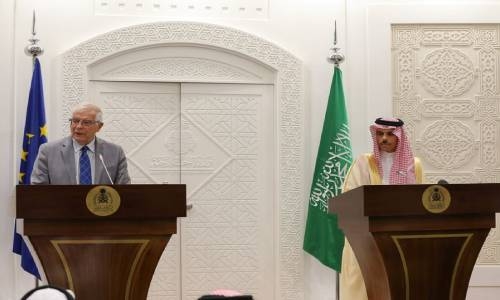Saudi Arabia confirms negotiations with Iran remain in ‘exploratory phase’
Agencies | Riyadh
The Daily Tribune – www.newsofbahrain.com
Saudi Arabia’s foreign minister Prince Faisal bin Farhan Al Saud said yesterday that talks between the Kingdom and Iran remain in the “exploratory phase”. “The fourth round of talks took place on September 21.
These discussions remain in the exploratory phase. We hope they lay the foundation to address the issues between the two sides and we will work to achieve that,” Prince Faisal said in a joint press conference with EU foreign policy chief Josep Borrell.
Prince Faisal did not give the location of the meeting. The date coincides with a speech by Raisi at the UN General Assembly in New York. Borrell also said he hoped nuclear talks between global powers and Iran would restart in Vienna “soon”.
The EU diplomat, who is in Riyadh following visits to Qatar and the UAE, said he briefed his partners on the prospects for restarting nuclear talks and exchanged views with Saudi officials on Yemen and Afghanistan. Iran’s foreign ministry spokesman Saeed Khatibzadeh said last month that talks between Tehran and Riyadh achieved “serious progress” on the issue of Gulf security.
Saudi Arabia and Iran began talks in April in an effort to contain tensions between them. Iraq’s president had said Baghdad hosted the talks. Saudi Arabia and its Gulf allies have long criticised Iran for its malign activities in the region through its network of proxies in Yemen, Syria and Iraq.
Borrell said that he addressed the Yemeni situation during his visit to Riyadh.
‘Not very encouraging’
Meanwhile, Borrell said yesterday the Taliban government’s behaviour up to now was “not very encouraging”, and any economic collapse in Afghanistan would raise the risk of terrorism and other threats.
The EU has increased its humanitarian aid to Afghanistan since the Taliban took power, but halted development assistance – a move also taken by other countries and the World Bank.
“Certainly it’s a dilemma. Because if you want to contribute to avoid the collapse of an economy, in a certain way, you can consider supporting the government ... Depending on their behaviour.
And their behaviour until now is not very encouraging,” Borrell said. “If the economy collapses, then the humanitarian situation will be much worse.
The tension for people to leave the country will be bigger, the threats the terrorist threat will be bigger and so the risks emanating from Afghanistan affecting the international community will be bigger,” he added.
Related Posts

